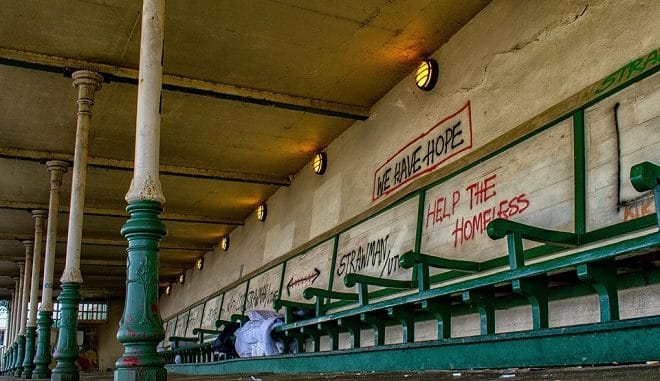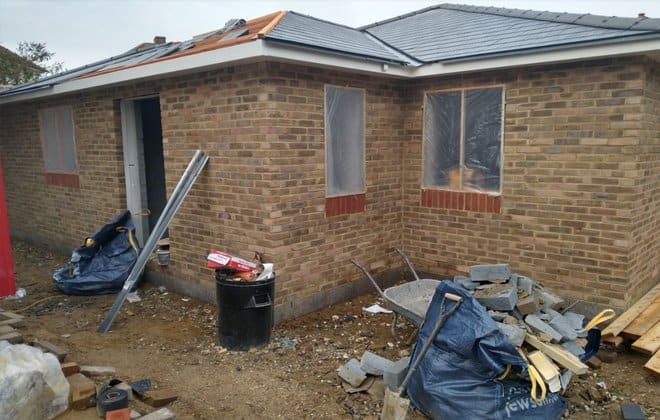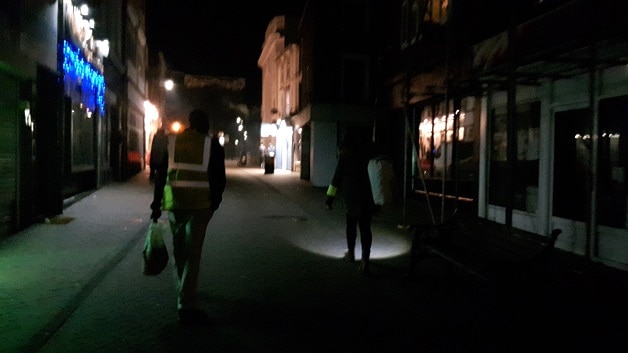
A plan to tackle the issue of accessibility to quality, affordable housing and to reduce homelessness has been approved by Thanet council.
The plan looks at the way existing accommodation is managed and how best to plan the delivery of new homes in the future.
The strategy aims to:
- Improve access to and supply of housing
- Improve housing standards and safety across all tenures (ownership or renting)
- Support the health and wellbeing of residents and communities
- Prevent homelessness and tackling rough sleeping
The Housing,Homelessness and Rough Sleeping Strategy from Thanet council outlines the stark reality of residents struggling to find, or keep, quality housing and how the authority hopes to tackle the issue over the next five years.
According to the report the loss of a private rented tenancy is the biggest reason for homelessness in Thanet with landlords able to select tenants that can afford higher rents and have access to rent-in-advance, deposits and guarantors.
Rising rents and low incomes

Thanet property costs, both rental and mortgage, are rising due to a lack of supply and the high rate of second homes on the isle. Many families on universal credit/ housing benefit and/or low wages are struggling to top up rents not covered by the set amount of housing allowance.
The report says: “For those on low incomes, the housing options are scarce with a reliance on social housing for rent. New ‘affordable rent’ at up to 80% of market rents is increasingly affordable to those on low incomes and the council’s Tenancy Strategy limits ‘affordable rents’ for new build homes to the relevant Local Housing Allowance rate to assist with this.
“There is also a growing ‘affordability gap’ where middle income households are being squeezed out of the market; with limited housing options for low cost home ownership or the private rented sector.
“The difficulties in accessing home ownership and the increasing cost of rental accommodation, is resulting in more employed households making approaches to the council.”
According to figures in the report there are 19,471 households – 29% of the Thanet population – on a low income, defined as less than £15,988 per annum.
On average earnings are £462.50 per week which is within the bottom 20% of the whole of England. This means more than 80% of the population in Thanet cannot afford to buy an averagely priced terraced house and those who are renting in the private sector are spending more than 50% of their earnings on living costs. The National Housing Federation says only 30% of income should be spent on housing costs.
The lack of affordable housing means more people living in poor quality accommodation, overcrowding or under-occupancy.
Read here: Locked Out: Housing benefit freeze putting rental properties out of reach for Thanet families
Increasing affordable homes

The new strategy includes aims to increase affordable homes, create a council housing company, target local residents with exclusive marketing for home ownership, continue to use disabled facility grants to adapt housing for older residents and improve working across agencies.
According to the report there are 67,000 homes in the Thanet district area with 3016 in council ownership. It is estimated that 1 in 7 people in the district live in a deprived area and 1 in 5 children in the district live in poverty.
As of September 2019, there were 2,354 households on the housing register with 109 listed as in urgent need and 200 in serious need, with the remainder listed as ‘reasonable preference.’
Just over half of those on the register need a one bed property with the next highest need for two bed properties. A third of those needing one-bed homes are over 60 years of age. Some 502 households on the housing register have a physical or mental health condition, made worse by their housing circumstances.
Shared ownership – where a resident can purchase anything from 25% upwards of their home – is one option the council is examining to make ownership more accessible.
More accessible homes will be created through the lowered threshold for affordable housing from 15 to sites of 10 or more units needing to provide 30% affordable housing.
Read here: Unaffordable housing: ‘Trapped at home aged 23 and sharing a room with my teenage brother’
Energy efficiency
The council’s own build programme will continue with a focus on making sure properties are energy efficient to lower utility bills.
According to the Department of Business, Energy & Industrial Strategy, 10.6% of households in the district live in fuel poverty which impacts on their health and well-being. Fuel Poverty is defined by a low income household with high costs. If fuel costs are above average, by paying for that amount, the remaining household income falls below the official poverty line.
The highest concentrations of fuel poverty are in the private sector and are found in wards of Cliftonville West, Margate Central and Eastcliff with excess cold concentrated in the Thanet Villages, Dane Valley and Central Harbour.
Some 11% of the private sector homes in Thanet also contain a Category 1 Hazard, defined by the Housing Health and Safety Rating System as a serious and immediate risk to a person’s health and safety. This relates to damp and mould in properties. The report says the cost of dealing with these hazards would be approximately £18.8m.
Thanet council aims to invest more in energy measures for homes including heating improvement, double glazing, solid wall insulation and solar hot water which will enable over 36% reduction in energy demand.
A reduction of 20% in energy demands could also be made by implementing heating improvements within tower blocks across the district
Read here: Council plans to create its own housing company to tackle isle shortage
Working with other services
The strategy says linking up with services to promote better health and wellbeing will also form part of the housing plan. This aims to help people live independently for longer, develop online skills so people can access services, target isolation and work to support those with mental ill health, disabilities and young people – especially care leavers – who need to access housing.
Work will also take place with landlords and on selective licensing.
Council housing management comes back ‘in-house’ from October after the four east Kent councils voted to ditch the contact with East Kent Housing.
Homelessness

The strategy includes proposals to reduce homelessness in Thanet. The council receives government funding for its homelessness service and following the introduction of the Homelessness Reduction Act 2017, the amount significantly increased.
Between 2017/18 and 2019/20, the council received £917,685 in Flexible Homelessness Support Grant as well as £328,387 new burdens funding. The council has increased the staff resources in the Housing Options team with four new posts created
Further funding was received during the covid ‘lockdown’. Thanet council received £12,750 from a government pot of £3.2 million aimed at helping local authorities get people off the streets. This was used towards paying £57.28 per person, per night for hotel accommodation with an enhanced management service. Some 42 people were accommodated.
Thanet council’s RISE team (Rough sleeper Intervention, Support and Empowerment) headed up the efforts, working with all those placed and carrying out virtual support meetings.
Complex needs

The housing and homelessness report says: “The number of people found rough sleeping has risen year on year across the whole Thanet. Our population of rough sleepers is made up of individuals who have a local connection to the Thanet and also those from wider Kent, UK and the European Union.
“Each of these individuals are unique with their own history of how they came to sleep rough and what resources and housing options are open to them in Thanet. Although the RISE team has made significant progress in supporting people into accommodation, new people moving onto the streets for the first time continues to rise.
“Rough sleepers with a local connection often have very complex needs (e.g. people with a triple diagnosis and/or a serious forensic history, couples and people with pets) and therefore need very sophisticated and personalised accommodation and support options.
“A major concern for our rough sleeping population is the level of substance misuse resulting in and being a response to both their physical and mental health needs.
“Those who are very entrenched in a street lifestyle can often be resistant to taking up offers of support (including health and substance abuse support) and accommodation options. These individuals can also contribute to notable levels of anti-social behaviour that negatively impacts on the community.
“Some clients with a local connection to Thanet are unwilling to access accommodation in other areas while others face the reality of the lack of specialist provision for people with dogs. There are a number of people who return to rough sleeping after a period of time in either temporary or long-term accommodation.
“We know that rough sleeping is harmful and dangerous for the individual. Recent studies indicate that the average life expectancy for a rough sleeper is 47 years.
“Thanet is fully committed to ending rough sleeping by preventing people sleeping rough for the first time and reducing the number of individuals currently sleeping on the streets. The council will work in line with the MHCLG’s aim to halve rough sleeping over the course of the Parliament (by 2022) and eliminate it altogether by 2027.”
Thanet council will continue the use of specialist outreach workers to support rough sleepers with a focus on health and wellbeing to move people from the streets and into accommodation.
Staff are also working closely with other agencies so as to be able to offer information on services that help with problems that often cause homelessness or housing difficulties. This includes money advice, debt counselling, landlord and tenant mediation, specialist legal advice, help in accessing education and training, help in seeking work, access to child care and Children’s Centres.
There will be continued support for homeless drop ins, food kitchens and the Thanet Winter Shelter.
The strategy was approved at a full council meeting on Thursday (July 9).

During that meeting Green councillor Becky Wing raised the issue of rough sleepers with more complex needs that are ‘bounced in and out of tenancies.’
She said further work should be carried out, adding: “We have got to try and think of creative ways to help support people to maintain tenancies and look at ways of ensuring that we do not leave services like the Salvation Army as the last port of call as that is what is happening now.”
Councillor Reece Pugh also raised the case of mum Charlotte Snook who is living in ‘unfit’ accommodation which is owned by the council.

Cllr Whitehead, who was praised for her exhaustive work on the plan, said the council would be an ‘exemplary landlord’ when the service returns to authority control.
She said the housing plan was created with input from councillors across the political parties as well as TDC housing staff.
Read here: New Ramsgate houses being built in £2.5m affordable homes project
Read here: From homelessness and addiction to work and becoming a home owner – “do not give up on hope”
Read here: Artist John finally finds a home after almost one year on the streets
Read here: Thanet Winter Shelter: ‘Resetting the lives of our clients’

